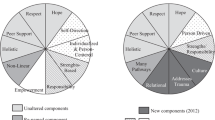Abstract
Continuity of care (COC) is often used as an indicator of treatment quality for patients with severe psychiatric or addictive disorders. However, few studies have examined the relationship between measures of COC and treatment outcomes. This study used standard regression models to examine the strength of the association between continuity of care measures and health outcomes for a sample of female veterans newly entering outpatient treatment for PTSD. There were few consistently significant associations between COC and outcome measures. Four months following program entry only one measure of treatment process, commitment to treatment, was positively associated with one or more continuity of care measures and several COC measures were associated with poor outcomes. Eight months following program entry patients with greater COC during the first four months of treatment had greater declines in violent behavior and PTSD measurements and larger increases in global functioning. However, when a Bonferonni corrected alpha of P <.001 was used to adjust for multiple comparisons, none of the relationships remained statistically significant. Thus, this study provides only weak and inconsistent evidence of the clinical benefits of continuity of care.
Similar content being viewed by others
REFERENCES
Bachrach, L: Continuity of care for chronic mental patients: A conceptual analysis. American Journal of Psychiatry 138:1449-1456, 1981.
Bachrach, L: Continuity of care and approaches to case management for long-term mentally ill patients. Hospital and Community Psychiatry 44:465-468, 1993.
Lehman, AF, Postrado, L, Roth, D: Continuity of care and client outcomes in the Robert Wood Johnson Foundation Program on chronic mental illness. Millbank Quarterly 72:105-122, 1994.
Moos, R, Finney, J, Federman, E, et al: Specialty mental health care improves patients' outcomes: Findings from a nationwide program to monitor the quality of care for patients with substance use disorders. Journal of Studies on Alcohol 9:704-713, 2000.
Bindman, J, Johnson, S, Szmukler, G, et al: Continuity of care and client outcomes: A prospective cohort study. Social Psychiatry Psychiatric Epidemiology 35:242-247, 2000.
Druss, BG, Rosenheck, RA: Evaluation of the HEDIS behavioral health care measure. Psychiatric Services 48:71-79, 1997.
Tessler, R: Continuity of care and client outcomes. Psychosocial Rehabilitation Journal 11:40-53, 1987.
Greenberg, GA, Rosenheck, RA, Fontana, A (p): Continuity of care and clinical effectiveness: Treatment of posttraumatic stress disorder in the Department of Veterans Affairs. Journal of Behavioral Health Services and Research 30:202-214, 2003.
Greenberg, GA, Rosenheck, RA, Seibyl, C: Continuity of care and clinical effectiveness: Outcomes following residential treatment for severe substance abuse. Medical Care 40:246-259, 2002.
Fontana, AF, Rosenheck, RA: Improving the efficiency of resource utilization in outpatient treatment of posttraumatic stress disorder. Administration and Policy in Mental Health 23:197-210, 1996.
Brekke, J, Ansel, M, Long, J, et al: Intensity and continuity of services and functional outcomes in the rehabilitation of persons with schizophrenia. Psychiatric Services 50:248-256, 1999.
Rosenheck, R, Greenberg, GA, DiLella, D: National Mental Health Program Performance Monitoring System: Fiscal Year 2000 Report. West Haven, CT, Northeast Program Evaluation Center, 2001.
Bice, TW, Boxerman, SB: A quantitative measure of continuity of care. Medical Care 4:347-349, 1977.
Pugh, TP, MacMahon, B: Measurement of discontinuity of psychiatric inpatient care. Public Health Reports 82:533-538, 1967.
Fontana, A, Rosenheck, R: Women Under Stress: Evaluation of the Clinical Performance of the Department of Veterans Affairs Women's Stress Disorder Treatment Teams. West Haven, CT, Northeast Program Evaluation Center, 2002.
Smilkstein, G, Ashworth, C, Montana, D: Validity and reliability of the Family APGAR as a test of family function. Journal of Family Practice 15:303-311, 1982.
Horvath, AO, Greenberg, L: Development and validation of the working Alliance Inventory. Journal of Counseling Psychology 36:223-233, 1989.
Neale, MS, Rosenheck, RA: Therapeutic alliance and outcomes: A VA intensive case management program. Psychiatric Services 46:719-721, 1995.
Chinman, M, Rosenheck, RA, Lam, J: The case management relationship and outcomes for homeless people with serious mental illness. Psychiatric Services 51:1142-1157, 2000.
Attkisson, CC, Zwick, R: The client satisfaction questionnaire: Psychometric properties and correlations with service utilization and psychotherapy outcome. Evaluation and Program Planning 5:233-237, 1982.
Fontana, A., Rosenheck, R: Outcome Monitoring of VA Specialized Intensive PTSD Programs: FY 1996 Report. West Haven, CT, Northeast Program Evaluation Center, 1997.
Wolfe, J, Brown, PJ, Furey, J, et al.: Development of a wartime stressor scale for women. Psychological assessment. Journal of Consulting and Clinical Psychology 5:330-335, 1993.
McLellan, A, Luborsky, L, Cacciola, J: New data from the addiction severity index: Reliability and validity in three centers. Journal of Nervous and Mental Disease 173:412-423, 1985.
Kulka, RA, Schlenger, WE, Fairbanks, JA, et al.: Trauma and the Vietnam War Generation: Report of Findings from the National Vietnam Veterans Readjustment Study. New York, Brunner/Mazel, 1990.
American Psychiatric Association: Diagnostic and Statistical Manual of Mental Disorders, 4th ed. Washington, DC, American Psychiatric Press, 1994.
Endicott, J, Spitzer, RL, Fleiss, JL, et al.: The Global Assessment Scale: A procedure for measuring overall severity of psychiatric disturbance. Archives of General Psychiatry 33:766-771, 1976.
Lehman, AF. A quality of life interview for the chronically mentally ill. Evaluation and Program Planning 11:51-62, 1988.
Cockburn, J, Fahey, P, Sanson-Fisher, RW: Construction and validation of a questionnaire to measure the health beliefs of general practice patients. Family Practice 4:108-116, 1987.
Magill, M, Senf, J: A new method for measuring continuity of care in family practice residencies. Journal of Family Practice 24:165-168, 1986.
Desai, RA, Rosenheck, RA, Rothberg, A: Cross-system use among VA mental health patients living in Philadelphia. Administration and Policy in Mental Health 28(4):299-309, 2001.
Rosenheck, RA, Frisman, L, Essock, S: Impact of VA bed closures on use of state psychiatric services. Journal of Behavior Health Services and Research 28(1):58-66, 2001.
Author information
Authors and Affiliations
Rights and permissions
About this article
Cite this article
Greenberg, G.A., Fontana, A. & Rosenheck, R.A. Continuity and Intensity of Care Among Women Receiving Outpatient Care for PTSD. Psychiatr Q 75, 165–181 (2004). https://doi.org/10.1023/B:PSAQ.0000019757.85605.fd
Issue Date:
DOI: https://doi.org/10.1023/B:PSAQ.0000019757.85605.fd




